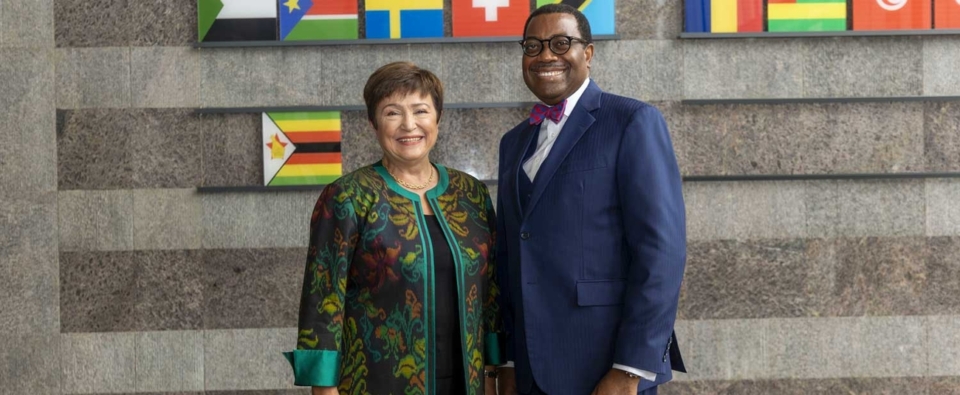The International Monetary Fund (IMF) has strongly supported a call by the African Development Bank Group urging countries in Africa to stop borrowing loans backed by their natural resources.
The IMF Managing Director, Kristalina Georgieva, met Thursday, October 5, 2023, with the President of the African Development Bank Group, Dr Akinwumi Adesina, in Abidjan, Cote D’Ivoire. It is the first time an IMF head has visited the Bank headquarters since its establishment in 1964.
Welcoming Madama Georgieva, Dr. Adesina said, “The natural resource-backed loans are non-transparent, expensive and make debt resolution difficult.” He warned that if the trend continues, “it will be a disaster for Africa.”
Madam Georgieva said the Fund’s senior management team will “carry out a thorough assessment. We will come with a strong voice to tell countries not to create avenues for predatory and enslaving loans.”
She said the issue would also be discussed at the Global Sovereign Debt Roundtable comprised of bilateral creditors, private creditors and borrowing countries. The roundtable is co-chaired by the IMF, World Bank and the presidency of the G20. The African Union joined the G20 in September as a permanent member.
The IMF chief said she is visiting Africa at a time when the continent holds much promise for more dynamic growth in the world.
“We often focus on the challenges that the continent is facing because it is here the impact of climate change is much more severe, where macro-economic and financial instability and debt are amplified.”
“But we want to focus on opportunities in Africa for the simple fact that the capital is in the North and a young population is in the South, primarily here in Africa. Unless we build a bridge for capital to flow to where it is needed most, it could lead to a bigger problem.”
Dr. Adesina praised bold efforts by the IMF chief and the US Secretary of Treasury Janet Yellen, at the height of the Covid-19 pandemic in 2021, to shore up the global economy by allocating $650 billion in Special Drawing Rights (SDRs).
Africa, with a population of more than 1.2 billion, received about $33 billion of SDRs, representing only 5 percent of the total allocation, the smallest portion among the different regions of the world.
The African Development Bank continues to lead conversations and develop models that will allow SDRs to be rechanneled through multilateral development banks. MDBs can leverage such resources three to four times their original values. Adesina thanked the IMF for working with the African Development Bank’s team on an initiative that could allow SDRs to be channeled through MDBs.
Latest Stories
-
Samuel Yaw Adusei: The strategist behind NDC’s electoral security in Ashanti region
34 seconds -
I’m confident posterity will judge my performance well – Akufo-Addo
12 minutes -
Syria’s minorities seek security as country charts new future
53 minutes -
Prof. Nana Aba Appiah Amfo re-appointed as Vice-Chancellor of the University of Ghana
60 minutes -
German police probe market attack security and warnings
1 hour -
Grief and anger in Magdeburg after Christmas market attack
1 hour -
Baltasar Coin becomes first Ghanaian meme coin to hit DEX Screener at $100K market cap
2 hours -
EC blames re-collation of disputed results on widespread lawlessness by party supporters
2 hours -
Top 20 Ghanaian songs released in 2024
2 hours -
Beating Messi’s Inter Miami to MLS Cup feels amazing – Joseph Paintsil
3 hours -
NDC administration will reverse all ‘last-minute’ gov’t employee promotions – Asiedu Nketiah
3 hours -
Kudus sights ‘authority and kingship’ for elephant stool celebration
3 hours -
We’ll embrace cutting-edge technologies to address emerging healthcare needs – Prof. Antwi-Kusi
3 hours -
Nana Aba Anamoah, Cwesi Oteng special guests for Philip Nai and Friends’ charity event
4 hours -
Environmental protection officers receive training on how to tackle climate change
4 hours

